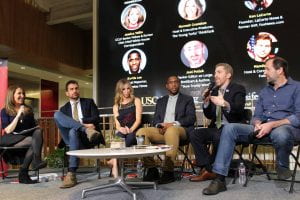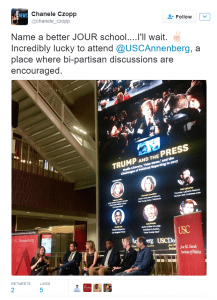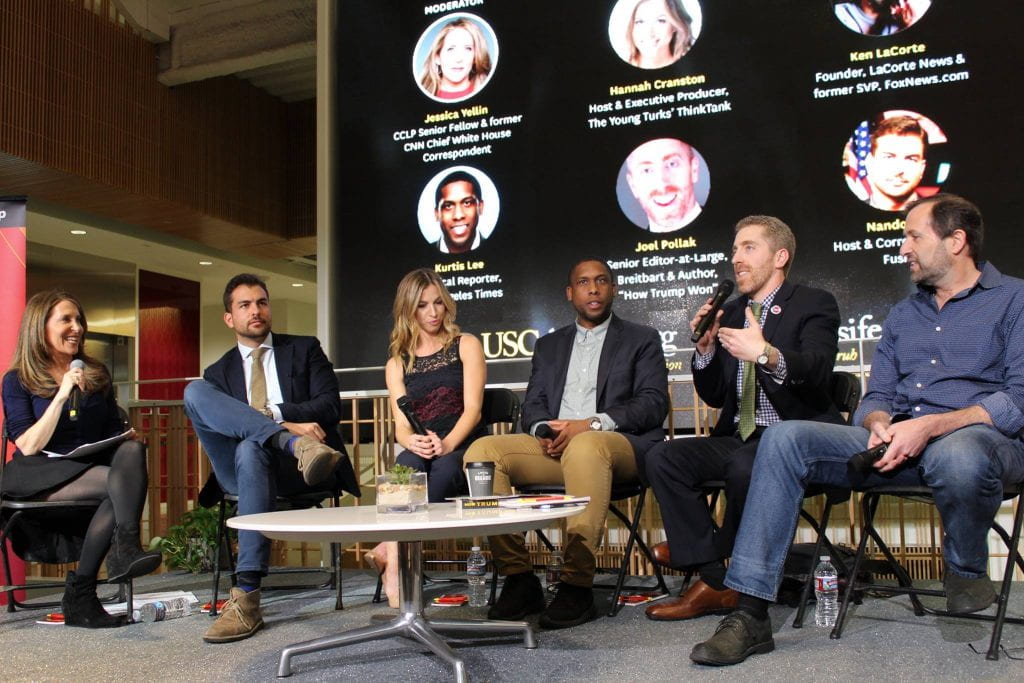By: Anna Blue
On March 7, CCLP brought together over 200 students, staff, and faculty in a captivating conversation about journalism, politics, and civic engagement. That night, in the lobby of USC’s Wallis Annenberg Hall, CCLP, in collaboration with the Jesse M. Unruh Institute of Politics, brought together a number of media heavyweights from across the ideological spectrum to discuss news coverage in the age of Trump.
 Moderated by Jessica Yellin, a CCLP Senior Fellow and former CNN Chief White House Correspondent, the panel included Nando Vila, Host and Correspondent at Fusion; Hannah Cranston, Host and Executive Producer of The Young Turks’ ThinkTank; Ken LaCorte, Founder of LaCorte News and former SVP of FoxNews.com; Kurtis Lee, a Political Reporter for the Los Angeles Times; and Joel Pollak, Senior Editor-At-Large of Breitbart News and Author of “How Trump Won”. The event, which touched on the “opposition party” mentality of the press, coverage of local vs. national politics, and the rise of alternative media, was streamed on Facebook Live and covered by The Daily Trojan.
Moderated by Jessica Yellin, a CCLP Senior Fellow and former CNN Chief White House Correspondent, the panel included Nando Vila, Host and Correspondent at Fusion; Hannah Cranston, Host and Executive Producer of The Young Turks’ ThinkTank; Ken LaCorte, Founder of LaCorte News and former SVP of FoxNews.com; Kurtis Lee, a Political Reporter for the Los Angeles Times; and Joel Pollak, Senior Editor-At-Large of Breitbart News and Author of “How Trump Won”. The event, which touched on the “opposition party” mentality of the press, coverage of local vs. national politics, and the rise of alternative media, was streamed on Facebook Live and covered by The Daily Trojan.
There was surprisingly more agreement throughout the night than might have been expected of a panel so ideologically diverse. All the speakers contended that fake news is an alarming new trend and one that is, as Vila put it, “impossible to understand outside of the context of a collapse in trust of the established media.” Vila attributed the lack of faith in media to the “superficial”, sports reporting-style of the Washington press’ coverage of politics. Cranston chimed in to explain that the authenticity of her show,  which unpacks dense political news in a relatable and accessible way, is what attracts so much of her millennial viewership. LaCorte, a veteran of Fox News, warned about two types of fake news: the factually inaccurate and false news and the news of political opponents that is dramatically overblown and played off as fake.
which unpacks dense political news in a relatable and accessible way, is what attracts so much of her millennial viewership. LaCorte, a veteran of Fox News, warned about two types of fake news: the factually inaccurate and false news and the news of political opponents that is dramatically overblown and played off as fake.
Perhaps the most thought-provoking and contentious topic of the night was how President Trump’s tweets have changed what news outlets  are reporting on. Pollak, the reporter that wrote the Breitbart article many believe inspired Donald Trump’s tweets about wiretapping by the Obama administration, called Trump’s tweets clever because they re-directed the media away from covering the real stories, such as the Congressional Review Act.
are reporting on. Pollak, the reporter that wrote the Breitbart article many believe inspired Donald Trump’s tweets about wiretapping by the Obama administration, called Trump’s tweets clever because they re-directed the media away from covering the real stories, such as the Congressional Review Act.
The night concluded with recommendations from the panelists on how to reform journalism; Lee noted how difficult it is to write “more meaty” stories because of the constant demands to keep up with the “quick hits of the cycle” and recommended that reporters “step out of the silo of the news cycle” to cover the real issues that affect everyday Americans.
“Trump and the Press” raised important questions about the California experiment in leftist politics, the media’s vigilance, and press coverage of local politics. With more events on Spanish-language programming and the effect of social media on children in the works, CCLP will continue to weave the stimulating themes of last night into our work and our programming.
